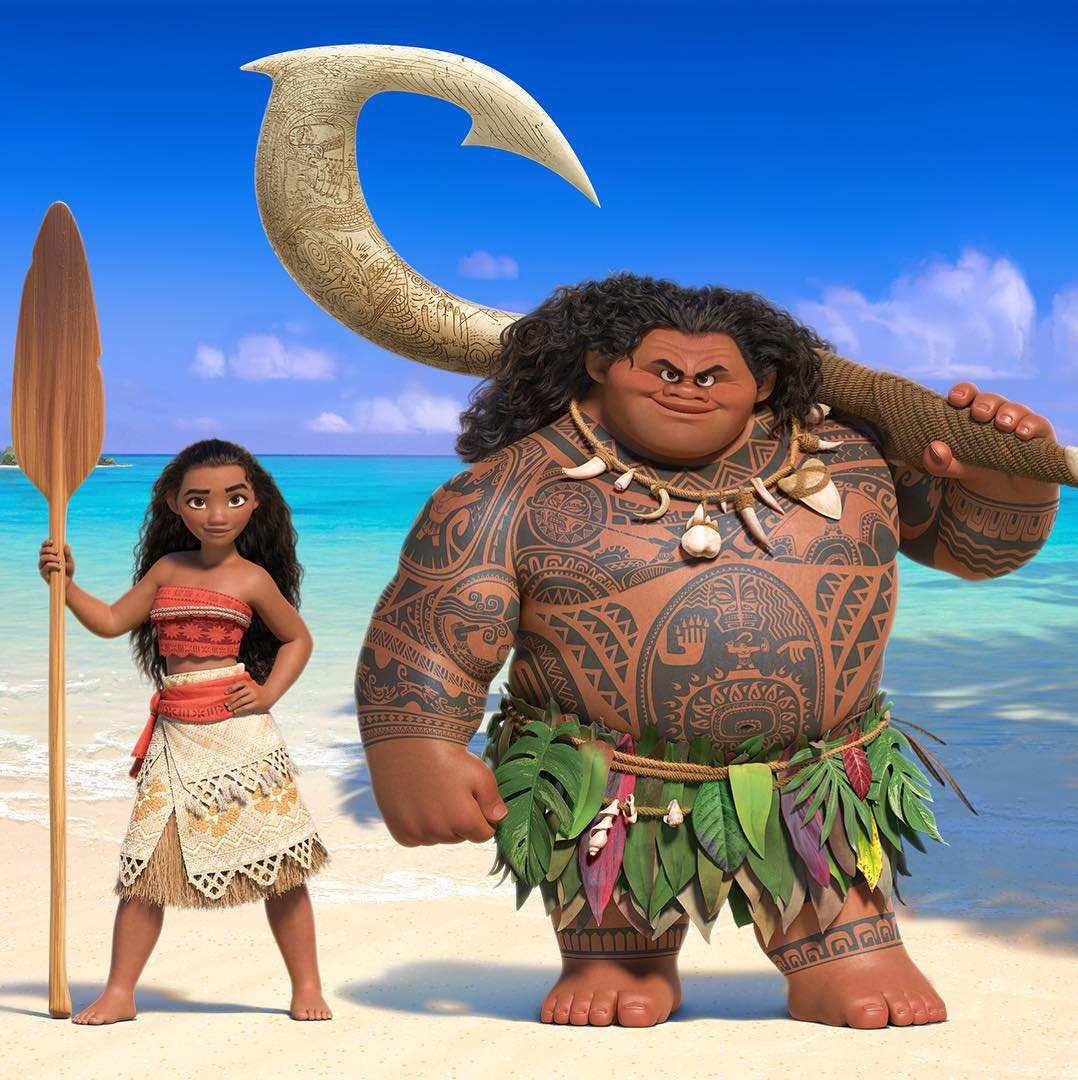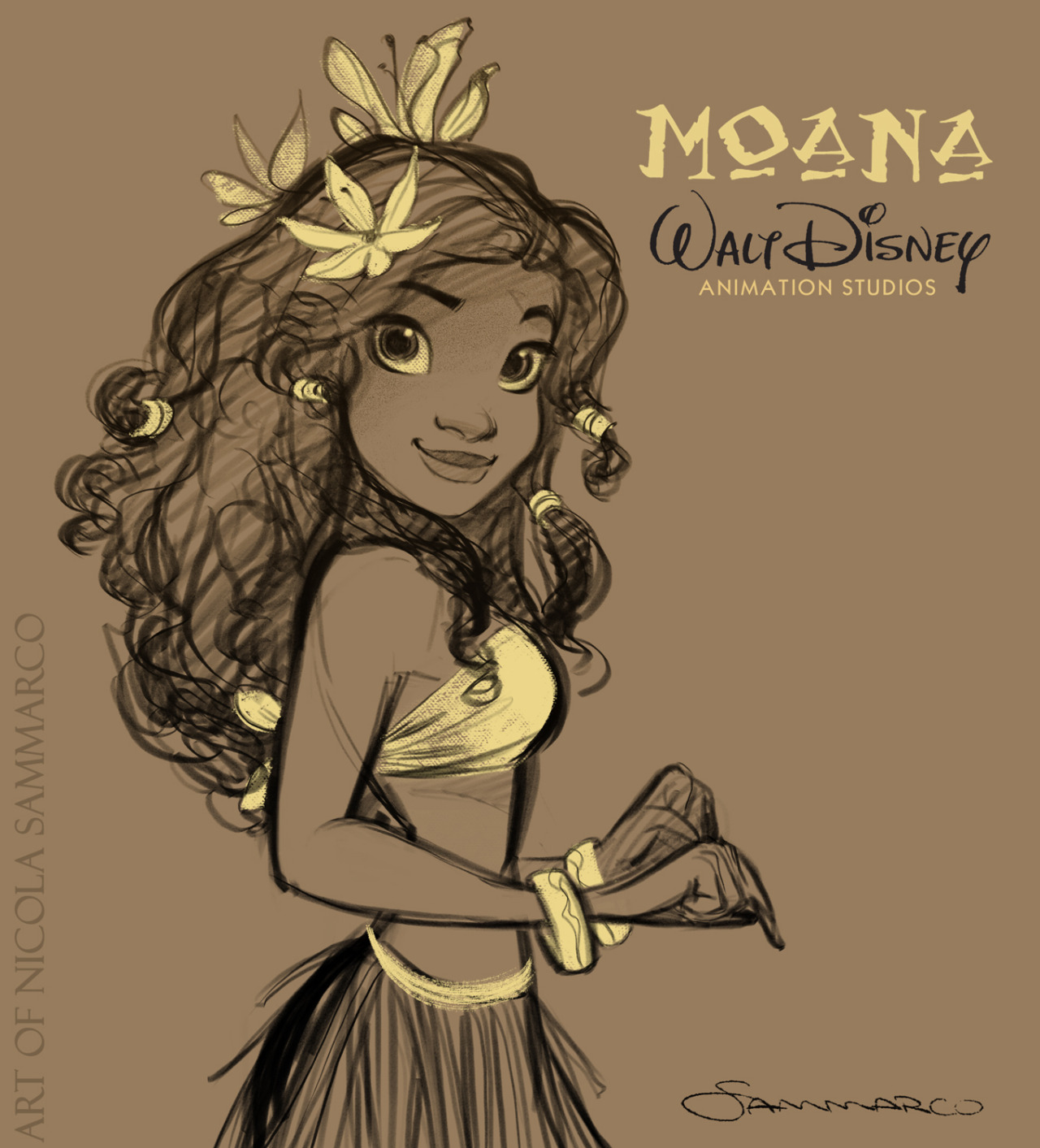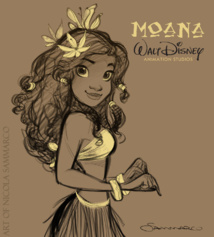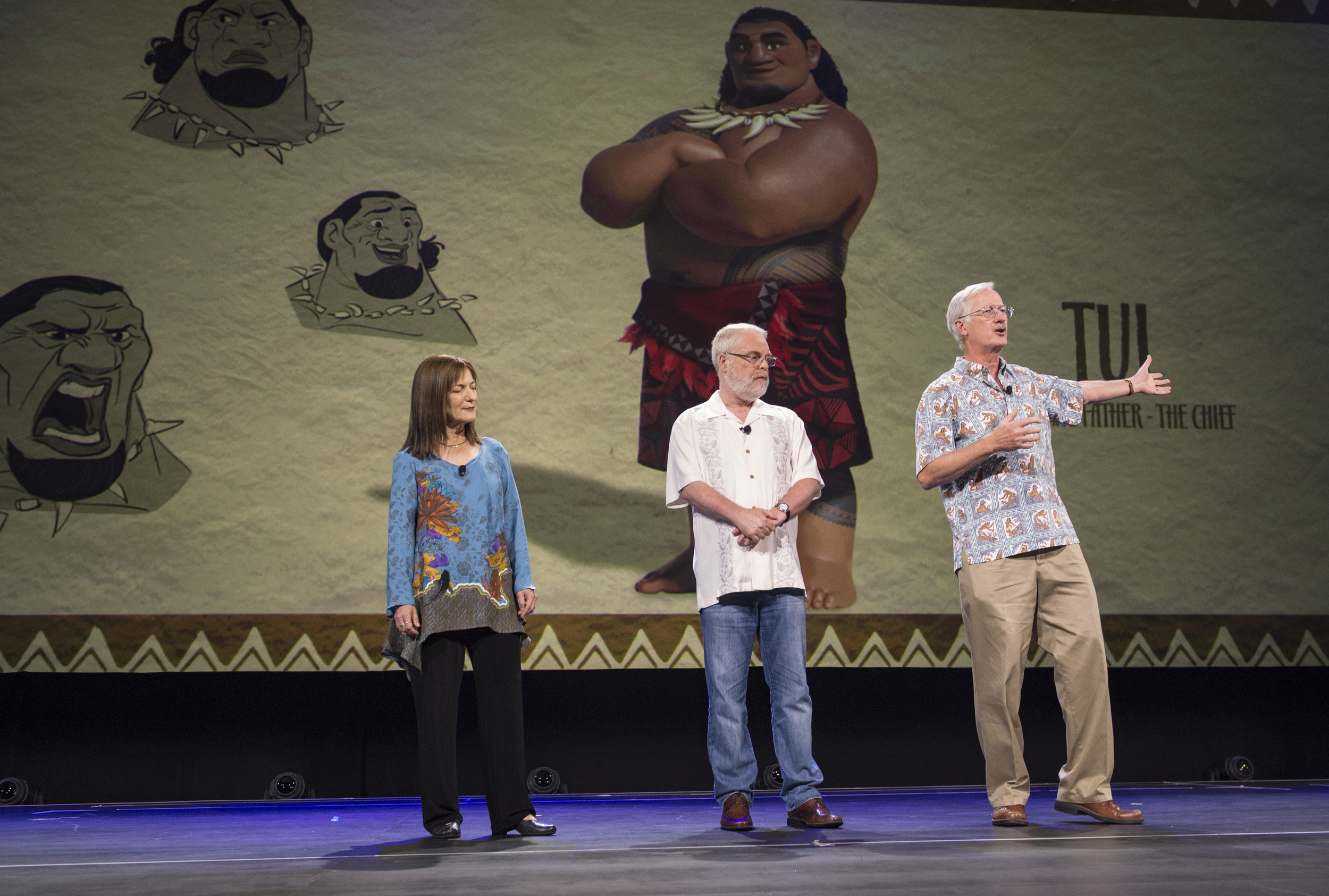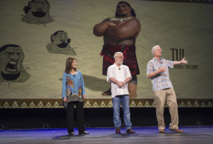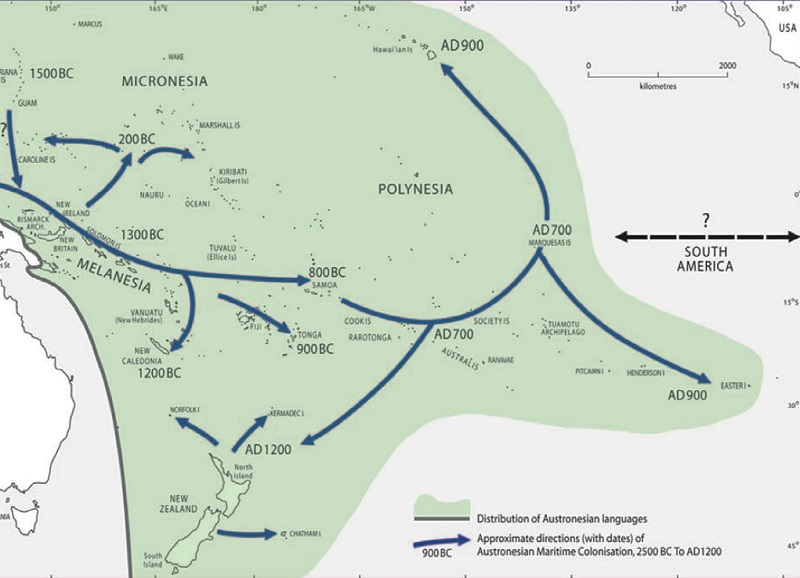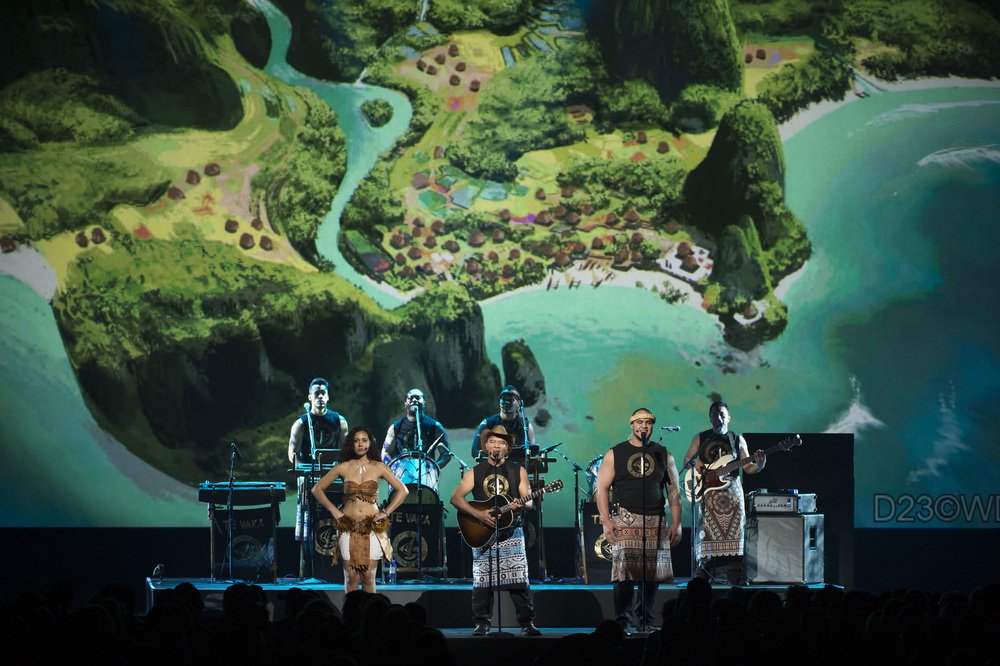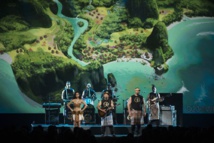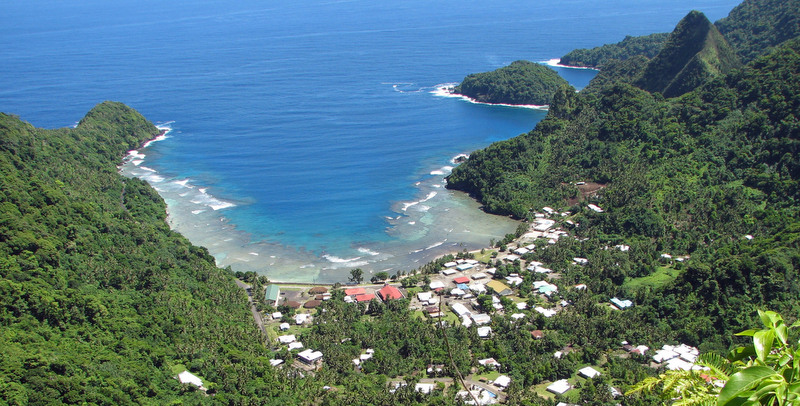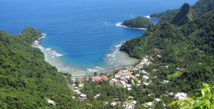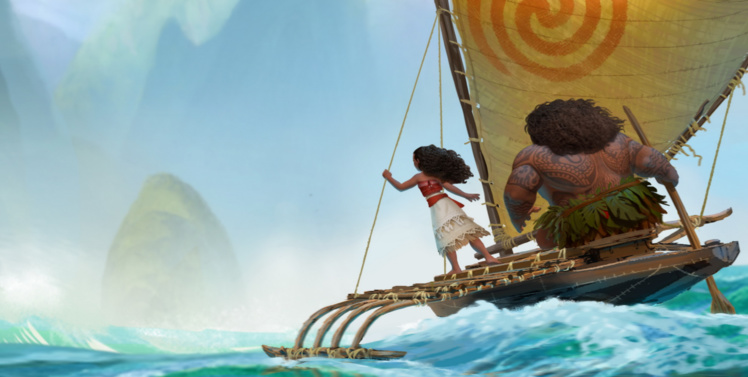Disney's 12th princess, staring in an animated movie to be released in November 2016, is not from Hawaii nor New Zealand, contrary to fan theories. Although Disney hasn't confirmed anything, multiple clues left by the directing team indicate she most probably comes from a little-known island in the South-West Pacific.
(TL;DR - Either Moana comes from American Samoa, or Disney doesn't care about historical accuracy)
PAPEETE, December 23rd 2015 - We don't know much about Disney 56th movie, except for a few details. Its story takes place in the South Pacific, and directors John Musker and Ron Clements (who collaborated on The Little Mermaid, Aladdin, Hercules or The Princess and the Frog) revealed a few key story points in the past six months.
(TL;DR - Either Moana comes from American Samoa, or Disney doesn't care about historical accuracy)
PAPEETE, December 23rd 2015 - We don't know much about Disney 56th movie, except for a few details. Its story takes place in the South Pacific, and directors John Musker and Ron Clements (who collaborated on The Little Mermaid, Aladdin, Hercules or The Princess and the Frog) revealed a few key story points in the past six months.
The plot centers around Moana, daughter of the tribe's chief. In the direct bloodline of a mythical seafarer, she takes on a quest to find a legendary island with the help of weakened-but-still-semi-god Maui. "Along the voyage they battle the treacherous ocean and all which it hides, all the while learning what the power love between friends can accomplish" sums up the synopsis. Official descriptions insist that "real mythology", somewhat of an oxymoron, is integrated in the story. We also know that a pig named Pua will be her pet, and that a rooster is part of the party. Both animals were brought with them to the Pacific islands by the first Polynesians, thus we see that Disney tries to stay accurate with archeological evidences.
It's a good thing, because the story is set 2000 years ago. In the universe of the movie, human colonization of the Pacific islands started 3000 years ago, or a millennia before Moana's birth. It stopped for an unknown reason, and Moana takes to the sea in an attempt solve this mystery and finish her ancestor's quest.
Moana is not a Hawaiian princess
When Disney presented her newest princess in 2014, the Internet fell fully in love with her. She will be the 12th Disney Princess and one of the few who isn't white. Her Polynesian origins enflamed the imagination of artists and an important fan-art community already exists. It's no surprise, then, that a flurry of theories were elaborated about the origins of Moana.
It's a good thing, because the story is set 2000 years ago. In the universe of the movie, human colonization of the Pacific islands started 3000 years ago, or a millennia before Moana's birth. It stopped for an unknown reason, and Moana takes to the sea in an attempt solve this mystery and finish her ancestor's quest.
Moana is not a Hawaiian princess
When Disney presented her newest princess in 2014, the Internet fell fully in love with her. She will be the 12th Disney Princess and one of the few who isn't white. Her Polynesian origins enflamed the imagination of artists and an important fan-art community already exists. It's no surprise, then, that a flurry of theories were elaborated about the origins of Moana.
For instance, her full name is Moana Waialiki, which has a Hawaiian ring to it because of the "W", uncommon in the rest of Polynesia. In Hawaii, it would mean "Water king", with an unnecessary "k". Hawaiian were outraged by the spelling error… And she officially comes from the South Pacific (Hawaii is in the Northern Hemisphere). So what gives? Will the Disney team just treat Polynesian islands and legends like pretexts and don't give a damn about accuracy?
Not necessarily. Indeed, the "W" exists in another Polynesian language: Maori from New Zealand. But then, for Hawaii as for Aotearoa (New Zealand's Maori name), these islands were totally empty of human presence when Moana is supposed to be born: they were colonized only at the beginning of the second millennium, between year 900 AD and 1200 AD…
Back to the origin of the Polynesian language
But before we call on Disney for another act of inconsiderate patching-up of a whole mythology, we have to dig deeper. Indeed, the "W" did exist wildly in Polynesian communities 2000 years ago! The Proto-Polynesian language, recreated by historical linguists using the comparative method and building back from contemporary languages, did use the sound. It got lost later, replaced by a simple "V" in all of the Polynesian Triangle except for two of its tips. So it all works out in the end: Moana is not from Hawaii, and neither is she from New Zealand. She has to come from Tonga or Samoa, the two first archipelagoes where the Polynesian People was born. They were the only Polynesian islands with a population at the time…
Not necessarily. Indeed, the "W" exists in another Polynesian language: Maori from New Zealand. But then, for Hawaii as for Aotearoa (New Zealand's Maori name), these islands were totally empty of human presence when Moana is supposed to be born: they were colonized only at the beginning of the second millennium, between year 900 AD and 1200 AD…
Back to the origin of the Polynesian language
But before we call on Disney for another act of inconsiderate patching-up of a whole mythology, we have to dig deeper. Indeed, the "W" did exist wildly in Polynesian communities 2000 years ago! The Proto-Polynesian language, recreated by historical linguists using the comparative method and building back from contemporary languages, did use the sound. It got lost later, replaced by a simple "V" in all of the Polynesian Triangle except for two of its tips. So it all works out in the end: Moana is not from Hawaii, and neither is she from New Zealand. She has to come from Tonga or Samoa, the two first archipelagoes where the Polynesian People was born. They were the only Polynesian islands with a population at the time…
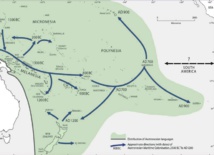
The settlement of the Polynesian Triangle. Dates here represent only one of the theories. (Source of the graphic : Hawaiian DNA blog)
Knowing that, it becomes clear that the prehistory of Polynesia and founding legends (Maui is supposed to have created the Polynesian islands himself and tamed the Sun) will be a central part of the story. Especially when you know that leading theories about human settlements in the South Pacific state that the Polynesian people was born by differentiating from the Lapita civilization around the years 1500–1000 BC. In this period, the Polynesian culture, language and even physical appearance were established.
This new civilization then colonized all of the Samoa and Tonga islands, and stayed put for 1500 or 2000 years before reawakening and exploring the whole of the Pacific Ocean. Specialists think that they had to wait for the invention of the double-hull canoe, or that they became too numerous for these small islands. A lot still argue that all evidence only lead to think that they just suddenly wanted to explore some more, because of some kind of cultural change… In truth, it's still a mystery. But it fits perfectly with the story of Moana (with a 300-1000 years discrepancy. Nothing, really, on a 3000 years scale). We can assume it is not a coincidence.
Two candidates for Moana's origin: Tongatapu or Tutuila
This historical inquiry serving us so well, we could as well follow this lead up to Moana's birthplace and settle once and for all the dispute about her origin. Back to the story, we know that Moana's mythical ancestor is a leading explorer and seafarer of her civilization, and that his children are the chiefs of her tribe. So he must be the founding father of this people... Find the origin of the Polynesians, find the origin of Moana…
As it happens, there are – as of now – two competing theories about the origin of the Polynesian civilization. The oldest traces of settlers in the region were found in 2008 by Canadian archeologist David Burley on the Nukuleka digging site. It is a small fishing village on the coast of the huge Fanga'uta laguna, North-East of the Tongatapu island, biggest island in Tonga. According to the scientist, this must be the place where the Polynesian civilization was born. But this theory, although loved by Tongan people, is seriously contested by other experts. All of the DNA analysis of plants and animals (pigs and rats mainly) in the Polynesian Triangle as well as linguistic similarities indicate that most of the exploration and colonization of the rest of the Pacific Islands originated from Samoa. This side argues that the site in Tonga is probably another Lapita settlement, a people that birthed and then got absorbed by the later "real" Polynesian civilization.
So, Tonga or Samoa?
This new civilization then colonized all of the Samoa and Tonga islands, and stayed put for 1500 or 2000 years before reawakening and exploring the whole of the Pacific Ocean. Specialists think that they had to wait for the invention of the double-hull canoe, or that they became too numerous for these small islands. A lot still argue that all evidence only lead to think that they just suddenly wanted to explore some more, because of some kind of cultural change… In truth, it's still a mystery. But it fits perfectly with the story of Moana (with a 300-1000 years discrepancy. Nothing, really, on a 3000 years scale). We can assume it is not a coincidence.
Two candidates for Moana's origin: Tongatapu or Tutuila
This historical inquiry serving us so well, we could as well follow this lead up to Moana's birthplace and settle once and for all the dispute about her origin. Back to the story, we know that Moana's mythical ancestor is a leading explorer and seafarer of her civilization, and that his children are the chiefs of her tribe. So he must be the founding father of this people... Find the origin of the Polynesians, find the origin of Moana…
As it happens, there are – as of now – two competing theories about the origin of the Polynesian civilization. The oldest traces of settlers in the region were found in 2008 by Canadian archeologist David Burley on the Nukuleka digging site. It is a small fishing village on the coast of the huge Fanga'uta laguna, North-East of the Tongatapu island, biggest island in Tonga. According to the scientist, this must be the place where the Polynesian civilization was born. But this theory, although loved by Tongan people, is seriously contested by other experts. All of the DNA analysis of plants and animals (pigs and rats mainly) in the Polynesian Triangle as well as linguistic similarities indicate that most of the exploration and colonization of the rest of the Pacific Islands originated from Samoa. This side argues that the site in Tonga is probably another Lapita settlement, a people that birthed and then got absorbed by the later "real" Polynesian civilization.
So, Tonga or Samoa?
To solve this last mystery, a last clue : at the August presentation of the first pictures of the movie, Disney showed, as if it was unimportant, a scene representing a village built near a white-sand beach, in a small harbor surrounded by a river, mountains and rocky peaks. It most probably is Moana's village…
This eliminates Nukuleka, as the village is located near a huge laguna that has no mountains at all. But, in Tutuila, the biggest island in American Samoa (where we imagine the Disney team went to research graphical and cultural elements for the movie) there exists a National Park were mountains, rocky peaks, harbors, white-sand beaches and rivers are legion. Several of the sceneries there look eerily like Moana's village…
This eliminates Nukuleka, as the village is located near a huge laguna that has no mountains at all. But, in Tutuila, the biggest island in American Samoa (where we imagine the Disney team went to research graphical and cultural elements for the movie) there exists a National Park were mountains, rocky peaks, harbors, white-sand beaches and rivers are legion. Several of the sceneries there look eerily like Moana's village…
So all bets are on about Moana's origin, but our money is on Tutuila Island, in the American Samoa archipelago. But if you have another theory, feel free to share it in the comments. The final answer will be known at the latest in November 2016!
Acknowledgement: we'd like to thank the historian who warmly accepted to correct this article for accuracy. He doesn't wish to be cited by name in this piece.
Acknowledgement: we'd like to thank the historian who warmly accepted to correct this article for accuracy. He doesn't wish to be cited by name in this piece.












